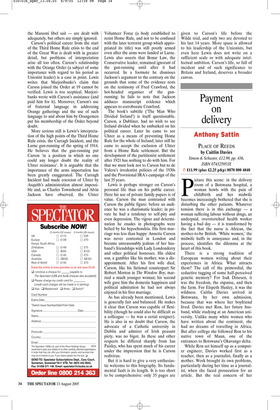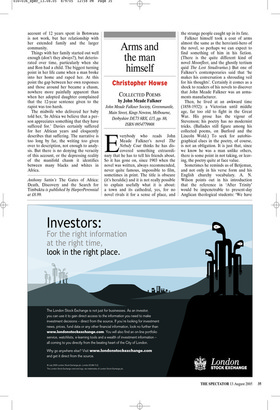Payment on delivery
Anthony Sattin
PLACE OF REEDS by Caitlin Davies Simon & Schuster, £12.99, pp. 436, ISBN 074325953X V £11.99 (plus £2.25 p&p) 0870 800 4848 Picture this scene: in the delivery room of a Botswana hospital, a woman howls with the pain of childbirth and her midwife becomes increasingly bothered that she is disturbing the other patients. Whatever tension there is in this exchange — a woman suffering labour without drugs, an underpaid, overstretched health worker having a bad day — it is transformed by the fact that the nurse is African, the mother-to-be British. ‘White women,’ the midwife huffs in annoyance and, in the process, identifies the dilemma at the heart of this book.
There is a strong tradition of European women writing about their experiences in Africa. What attracts them? The call of the primordial, the seductive tugging of some half-perceived genetic memory? For Isak Dinesen, it was the freedom, the expanse, and then the farm. For Elspeth Huxley, it was the wildness. Caitlin Davies arrived in Botswana, by her own admission, because that was where her boyfriend lived. Davies met Ron, her future husband, while studying at an American university. Unlike many white women who have written about the continent, she had no dreams of travelling in Africa. But after college she followed Ron to his native town of Maun, one of the entrances to Botswana’s Okavango delta.
While Ron set himself up as a computer engineer, Davies worked first as a teacher, then as a journalist, finally as a mother. Work brought its own problems, particularly during her time as a journalist, when she faced prosecution for an article. But the real concern of her account of 12 years spent in Botswana is not work, but her relationship with her extended family and the larger community.
Things with her family started out well enough (don’t they always?), but deteriorated over time, particularly when she and Ron had a child. The biggest turning point in her life came when a man broke into her home and raped her. At this point the gap between her own responses and those around her became a chasm, nowhere more painfully apparent than when her adopted daughter complained that the 12-year sentence given to the rapist was too harsh.
The midwife who delivered her baby told her, ‘In Africa we believe that a person appreciates something that they have suffered for.’ Davies certainly suffered for her African years and eloquently describes that suffering. The narrative is too long by far, the writing too given over to description, not enough to analysis. But there is no denying the veracity of this account, or the depressing reality of the manifold chasm it identifies between many blacks and whites in Africa.
Anthony Sattin’s The Gates of Africa: Death, Discovery and the Search for Timbuktu is published by HarperPerennial at £8.99.












































 Previous page
Previous page